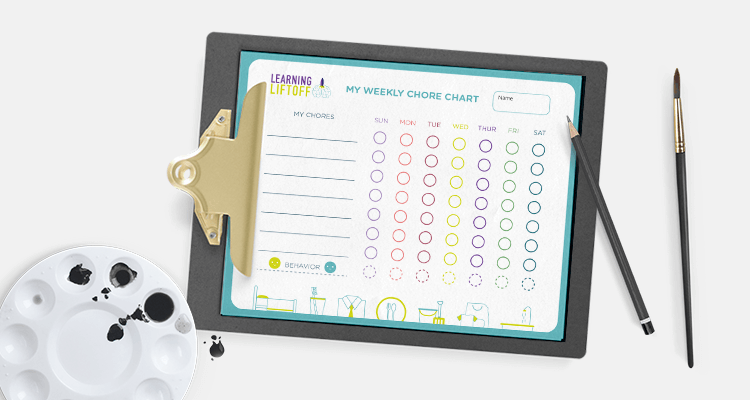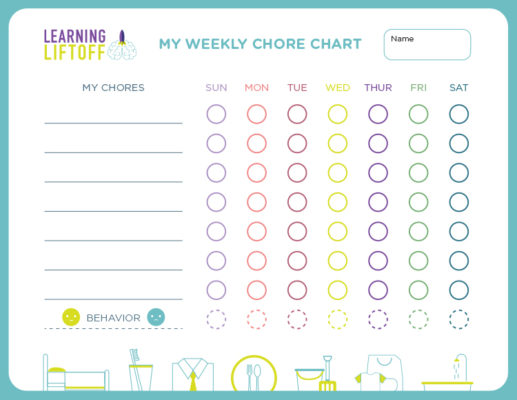Despite what your kids will want you to believe, studies and experience show that chores actually hold great benefit for children. Parents may be hesitant to force young kids to help around the house, citing that kids should be allowed to “just be kids” and “focus on having fun.” While there is much merit to striving to have your children focused on fun and living a stress-free life as long as is possible, there is also great importance to instilling responsibility and work ethic in them as well.
Physician and author, Dr. Marty Rossman, states that “the best predictor of young adults’ success in their mid-20s was that they participated in household tasks when they were three or four.” Even at such a young age, children can begin learning and cultivating skills that will prepare them for a lifetime of success. Below are some of the benefits of chores as well as our free, printable Weekly Chore Chart to use in your home!
Develop Life Skills
As schools continue to stop offering home economics courses, students are leaving home without basic life skills like cooking, home repairs, finances, car maintenance, etc. Chores facilitate an opportunity for children to learn these skills in order to function and operate a household once they leave the nest. Making age appropriate chores can help to incrementally develop these skills.
For example, a young child can begin with the simple task of putting their dirty clothes in a hamper. As they get older, that can increase to folding and hanging their clean clothes. By teenage years, they can learn how to operate the washing machine, treat stains, and even mend buttons and holes. If this has been the pattern, then by the time they move out they will be able to handle doing their own laundry. This same age-appropriate process can be applied across all types of chores, including dishes, cooking, cleaning the house, lawn care, and more.
Share in Communal Responsibility
An important life lesson for children to learn is that we all share responsibility for many things, including keeping a house running smoothly. The house doesn’t magically just get clean—it takes everyone working together to make it happen. This is similar to the concept of teamwork in that no one person can bear the burden of winning. It takes many working together to accomplish something great.
If learned correctly, hopefully this will instill the values of working cohesively with others, taking ownership of responsibilities, and recognizing the importance of not ignoring an opportunity to help. If you are capable of doing something, don’t wait for someone else to do it—own it!
Realize Hard Work Pays Off
It seems like younger generations oftentimes feel entitled to certain benefits without having to put in the work to achieve them. This notion of the world owing them something will, many times, lead to a pattern of laziness. Kids may feel as if parents “have to” do their laundry, clean their rooms, give them an allowance, cook for them, etc. Parents are the adults, so they are the ones having to work. What kids who believe that don’t realize, though, is just how good the sense of accomplishment can feel.
The lesson that hard work is rewarding manifests itself in many ways, but there are two that are arguably the most important. The first is that nothing will be earned that is not worked or fought for. Very few things in life come handed to us on a silver platter—if we want something, we must go get it. If a child wants to have a new toy, they must do extra chores to earn money to buy it. If a child wants to invite a friend over, then first they must clean their rooms to have a place to play. The second way is that if the child puts hard work into something, they are more likely to not destroy the work they’ve done! If they worked hard sweeping the floor, then they are less likely to stomp around all over it in their dirty boots. If they spent a long time carefully folding their clothes, chances are good they will think twice before dumping out their dresser drawers.
If you are ready to get your child organized and on-task with their chores, click on and print out this weekly chore chart.
Do you have any ideas for creative chores for your kids? At what age did you start your kids doing chores? Comment below, and let’s discuss!






































